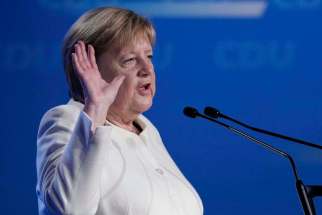Merkel set standard for ruling by consensus
Read this article for free:
or
Already have an account? Log in here »
To continue reading, please subscribe:
Monthly Digital Subscription
$0 for the first 4 weeks*
- Enjoy unlimited reading on winnipegfreepress.com
- Read the E-Edition, our digital replica newspaper
- Access News Break, our award-winning app
- Play interactive puzzles
*No charge for 4 weeks then price increases to the regular rate of $19.00 plus GST every four weeks. Offer available to new and qualified returning subscribers only. Cancel any time.
Monthly Digital Subscription
$4.75/week*
- Enjoy unlimited reading on winnipegfreepress.com
- Read the E-Edition, our digital replica newspaper
- Access News Break, our award-winning app
- Play interactive puzzles
*Billed as $19 plus GST every four weeks. Cancel any time.
To continue reading, please subscribe:
Add Free Press access to your Brandon Sun subscription for only an additional
$1 for the first 4 weeks*
*Your next subscription payment will increase by $1.00 and you will be charged $16.99 plus GST for four weeks. After four weeks, your payment will increase to $23.99 plus GST every four weeks.
Read unlimited articles for free today:
or
Already have an account? Log in here »
Hey there, time traveller!
This article was published 24/09/2021 (1537 days ago), so information in it may no longer be current.
Sixteen years is an eternity in politics.
It is difficult to remember a time when Angela Merkel wasn’t Germany’s chancellor, when she wasn’t the world’s leading female politician or when her pragmatism wasn’t a bulwark against the right wing’s worst impulses.
Ms. Merkel, who took office in 2005 and will step down shortly after Sunday’s federal elections in Germany, became known for being a moderate-minded foil to former U.S. president Donald Trump and for leading the way for migrants fleeing war in the Middle East to find new homes in Germany and other European countries.
Her popularity suffered as the number of migrants entering Europe rose sharply in 2015, but she refused to back down from her decision despite opposition to her immigration policies, some of which came from within her own party. Other leaders praised Ms. Merkel’s handling of the crisis, with another former U.S. president, Barack Obama, once saying “She is on the right side of history on this.”

But it’s her abilities to form a consensus that ought to be a key lesson politicians around the world — including in Canada — ought to take heed.
Majority governments are rare in Germany, owing to its multi-party political system and an electoral process that favours proportional representation. For anything to get done, coalitions must be formed, creating consensus-driven governments. During her 16 years in power, Ms. Merkel proved to be sufficiently shrewd to become Germany’s first female chancellor despite only having a plurality of seats in her country’s parliament. The key: being wily enough to maintain the top job while negotiating favourable terms with different coalition partners.
In doing so, she turned rivals into allies and positioned her government to benefit whichever way the political winds blew. Early in her tenure, Germany was the vanguard within the European Union when austerity measures were demanded by small-government partners.
Later, when paired in a “grand coalition” with Germany’s top opposition party, the centre-left Social Democrats, Ms. Merkel tacked to the left. That meant ushering in policies to lower carbon emissions in Germany, and announcing the country would close its nuclear reactors by 2022 in the wake of the 2011 nuclear-reactor disaster in Fukushima, Japan.
These political arrangements meant compromises, such as welcoming rivals into top positions in the cabinet, but also provided opportunities for Ms. Merkel to take credit for popular programs while allowing the blame for unpopular ones to stick to her coalition partners.
Canada’s recent federal election puts our country’s leaders in a similar situation. Justin Trudeau will lead another minority government and, if history is any indicator, any talks about forming a coalition government will come to nothing. Previous attempts at “governing like a majority,” whether by Mr. Trudeau’s Liberals or by previous Conservative minority governments, have usually led to political deadlock, cynical parliamentary manoeuvring and snap elections, all of which have proven to be unpopular with Canadians.
The COVID-19 pandemic has put Canada in a crisis. Soaring deficit figures reported by the Manitoba government and rising prices faced by consumers are red flags that further difficulty lies ahead for Canadians, and there is no vaccine for tough economic times.
Political discord and electoral stalemates haven’t worked. Our leaders should consider throwing out the old political playbook and exchanging it for a few of Ms. Merkel’s lessons about compromise and forming consensus. They might create some history of their own.









